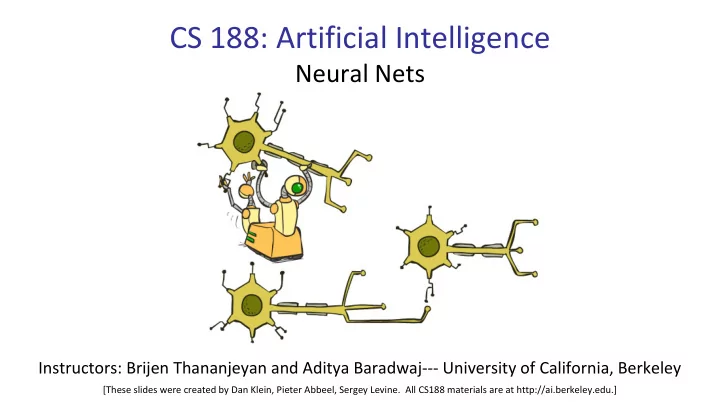

CS 188: Artificial Intelligence Neural Nets Instructors: Brijen Thananjeyan and Aditya Baradwaj--- University of California, Berkeley [These slides were created by Dan Klein, Pieter Abbeel, Sergey Levine. All CS188 materials are at http://ai.berkeley.edu.]
Announcements ▪ MT2 Self Assessment: on Gradescope + due Sunday ▪ Q5:clustering and Q7:decision trees: now optional on HW6 written component ▪ Tomorrow: Guest lecture canceled, math/ML review
Neural Networks
Multi-class Logistic Regression ▪ = special case of neural network f 1 (x) z 1 s o f 2 (x) f t z 2 f 3 (x) m a x … z 3 f K (x)
Deep Neural Network = Also learn the features! f 1 (x) z 1 s o f 2 (x) f t z 2 f 3 (x) m a x … z 3 f K (x)
Deep Neural Network = Also learn the features! x 1 f 1 (x) s o x 2 f 2 (x) f … t x 3 f 3 (x) m a … … … … x … x L f K (x) g = nonlinear activation function
Deep Neural Network = Also learn the features! x 1 s o x 2 f … t x 3 m a … … … … x … x L g = nonlinear activation function
Common Activation Functions [source: MIT 6.S191 introtodeeplearning.com]
Deep Neural Network: Also Learn the Features! ▪ Training the deep neural network is just like logistic regression: just w tends to be a much, much larger vector ☺ just run gradient ascent + stop when log likelihood of hold-out data starts to decrease
Neural Networks Properties ▪ Theorem (Universal Function Approximators). A two-layer neural network with a sufficient number of neurons can approximate any continuous function to any desired accuracy. ▪ Practical considerations ▪ Can be seen as learning the features ▪ Large number of neurons ▪ Danger for overfitting ▪ (hence early stopping!)
How about computing all the derivatives? ▪ Derivatives tables: [source: http://hyperphysics.phy-astr.gsu.edu/hbase/Math/derfunc.html
How about computing all the derivatives? ■ But neural net f is never one of those? ■ No problem: CHAIN RULE: If Then Derivatives can be computed by following well-defined procedures
Automatic Differentiation ▪ Automatic differentiation software ▪ e.g. Theano, TensorFlow, PyTorch, Chainer ▪ Only need to program the function g(x,y,w) ▪ Can automatically compute all derivatives w.r.t. all entries in w ▪ This is typically done by caching info during forward computation pass of f, and then doing a backward pass = “backpropagation” ▪ Autodiff / Backpropagation can often be done at computational cost comparable to the forward pass ▪ Need to know this exists ▪ How this is done? -- outside of scope of CS188
Summary of Key Ideas ▪ Optimize probability of label given input ▪ Continuous optimization ▪ Gradient ascent: ▪ Compute steepest uphill direction = gradient (= just vector of partial derivatives) ▪ Take step in the gradient direction ▪ Repeat (until held-out data accuracy starts to drop = “early stopping”) ▪ Deep neural nets ▪ Last layer = still logistic regression ▪ Now also many more layers before this last layer ▪ = computing the features ▪ the features are learned rather than hand-designed ▪ Universal function approximation theorem ▪ If neural net is large enough ▪ Then neural net can represent any continuous mapping from input to output with arbitrary accuracy ▪ But remember: need to avoid overfitting / memorizing the training data early stopping! ▪ Automatic differentiation gives the derivatives efficiently (how? = outside of scope of 188)
Computer Vision
Object Detection
Manual Feature Design
Features and Generalization [HoG: Dalal and Triggs, 2005]
Features and Generalization Image HoG
Performance graph credit Matt Zeiler, Clarifai
Performance graph credit Matt Zeiler, Clarifai
Performance AlexNet graph credit Matt Zeiler, Clarifai
Performance AlexNet graph credit Matt Zeiler, Clarifai
Performance AlexNet graph credit Matt Zeiler, Clarifai
MS COCO Image Captioning Challenge Karpathy & Fei-Fei, 2015; Donahue et al., 2015; Xu et al, 2015; many more
Visual QA Challenge Stanislaw Antol, Aishwarya Agrawal, Jiasen Lu, Margaret Mitchell, Dhruv Batra, C. Lawrence Zitnick, Devi Parikh
Semantic Segmentation/Object Detection
Speech Recognition graph credit Matt Zeiler, Clarifai
Recommend
More recommend